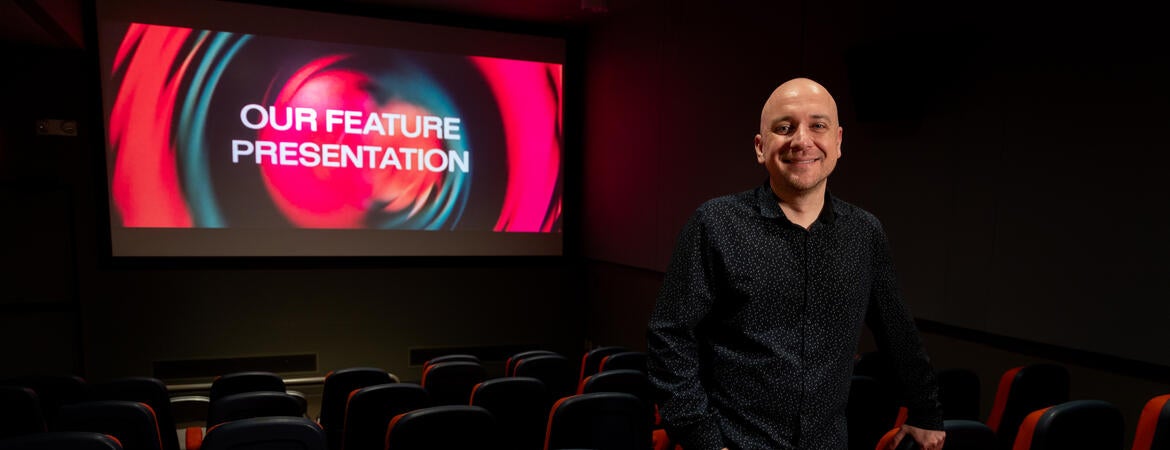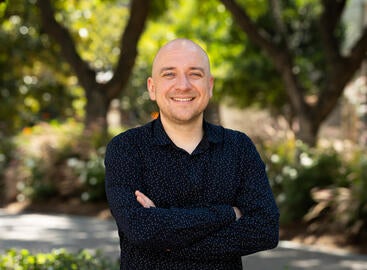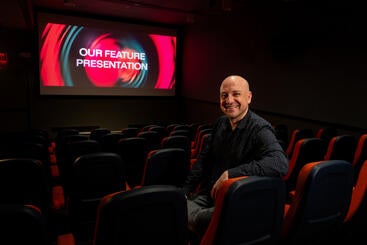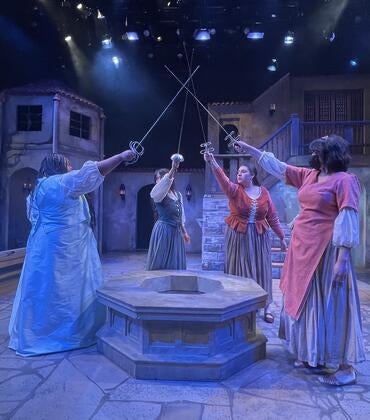
The curator of the only foreign and independent movie house in Riverside does watch shows on his laptop. But he’ll never give up watching film in person, and he doesn’t want you to, either.
Because the best films can provoke thought and dialogue and community, which are in ever diminishing supply, UCR alumnus Nikolay Maslov works hard as curator to make sure only the most innovative, exciting ones are being offered at UCR Arts’ Culver Cinema.
“Watching films gives us a chance to slow down and enter another world away from notifications or emails or anything else. It can be an escape as well as a fresh lens to view what’s going on in the world around us,” said Maslov, who has been with UCR Arts since 2010.
Films in general confer this benefit, but independent, experimental, and documentary films offer additional ones. They can showcase perspectives, languages, and creative styles not found in more mainstream productions.
Unfortunately, the number of smaller-budget films being produced, the number of indie film distributors, and the number of theaters showing them has decreased in the past decade. The 75-seat Culver Screening Room — the only theater in the areas of Riverside or San Bernardino counties dedicated to showing these films –- has been affected as well.
Maslov has had to reduce the number of screenings from weekly to a few times per month. But he won’t be deterred from showing them entirely because to him, cinema matters too much on an intellectual as well as a personal level.
The Maslov family immigrated to Los Angeles from Moscow, Russia, in 1991. His molecular biologist father became a UCR professor, while kindergarten-aged Nikolay learned English from TV and movies.
“Some of my earliest memories involve film, like hounding my mom to take me to 20/20 Video on Sepulveda Boulevard to rent Star Wars or the Wizard of Oz,” he said. “Exposure to the language helped, but the fantastical movie worlds really sucked me in. It felt magical.”
To bring some of that magic to Riverside, Maslov regularly checks which films are generating buzz in bigger cities or at festivals like Sundance or Cannes as well as what’s been nominated for an Academy Award in the documentary or foreign language categories.
He’s developed close working relationships with some of the few remaining boutique film distribution companies like A24, Neon, and Janus, who want the Culver Cinema to succeed.
Closer to home, he often fills the calendar with UCR student and faculty-made films.
“I try to do events with local filmmakers and have events that get people to connect face to face,” Maslov said.
Earlier this year, an event with UCR English professor and filmmaker Ricky Rodriguez sparked deep conversation about peoples’ personal experiences with immigration. “You can’t get that from a comment section online,” Maslov said.
Connection is enhanced when audiences can evaluate what they’re seeing with more discerning eyes. To that end, the Culver Center offers hands-on programs for young people that encourage students to make their own films about life in Riverside.
Becoming producers helps students to understand the sometimes-subtle ways we’re influenced by production decisions. “In film you’re watching the outcome of choices. Where did they place the camera? What did they leave in, or edit out?” Maslov said.
The need for these kinds of media literacy skills is only growing in the age of AI.
“There’s a flood of AI content that is totally indistinguishable from real content,” Maslov said. “If in our little way we can work with students, our community, and invite people to consider how things are made and distributed, we like to think this helps.”
Most of Maslov’s students have “an almost visceral revulsion to AI and don’t want to use it in films,” he said. But mostly, he’s encouraged by the students’ desire to be active media makers and participants in the world.
“That gets me out of the scrolling doom loops of dire headline after dire headline,” he said. “There’s a bigger world than what gets delivered to you on small screens.”
That bigger world doesn’t always have to feel heavy. Coming in October, the Culver Center is bringing back the ever-popular Cat Video Fest. It’s a 74-minute reel of “the latest and best cat videos culled from countless hours of unique submissions,” with proceeds benefitting local animal shelters.
Even the shared experience of laughing at cats can foster a sense of togetherness and to foster that, the Culver Cinema is more affordable than most chain theaters. General admission is $10, for students it’s $5, and a number of events throughout the year are free.
“In suburban Southern California, there aren’t too many third spaces — communal places in society that aren’t work or school where we can come together,” Maslov said. “We try hard to be that.”





